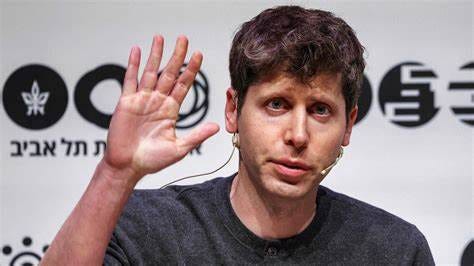Sam Altman’s Secret: What the Creator of GPT-4 Really Thinks About AI’s Future (And Why It Should Terrify You)"
How the CEO of OpenAI Balances Ambition with Responsibility in the Age of GPT-4
Introduction
What goes through the mind of someone who has helped create one of the most powerful technologies in human history? I’ve been reflecting on this question, particularly when it comes to Sam Altman, the CEO of OpenAI. From co-founding OpenAI in 2015 to overseeing the launch of GPT-4, Altman has demonstrated a unique blend of ambition, responsibility, and humility.
But how does he view the impact of AI now that it’s here? And what can we learn from his approach to innovation and ethics? Let’s explore how Sam Altman thinks—and why it matters for all of us.
What This Post Covers
Here’s what we’ll discuss:
Sam Altman’s vision for AI and its potential to solve global challenges.
How he balances optimism with caution when addressing AI’s risks.
Real-world examples of decisions he’s made that reflect his thinking.
Lessons we can draw from his leadership style.
Main Content
The Vision: “AI Will Be the Most Important Technology Humanity Has Ever Built”
When Sam Altman talks about AI, he doesn’t see it as just another technological advancement. He views it as a tool capable of reshaping the world. In interviews, he often emphasizes AI’s potential to address humanity’s biggest challenges, such as curing diseases, combating climate change, and improving education.
However, Altman is also deeply aware of the stakes. He once said:
“We’re building something incredibly powerful, and we have to get it right. If we do, it could be amazing for humanity. If we don’t, it could be catastrophic.”
This balance between excitement and responsibility defines his vision for AI. For Altman, the goal isn’t just to innovate—it’s to ensure that innovation benefits everyone.
The Ethical Dilemma: Balancing Innovation with Responsibility
After the launch of GPT-4, there was significant debate about the ethical implications of AI. Critics raised concerns about misinformation, job displacement, and the potential misuse of the technology.
Altman’s response has been pragmatic yet reflective. He has called for governments and organizations to collaborate on regulating AI. As he put it:
“I think we need a new framework for governing AI. It’s too important to leave entirely in the hands of private companies or individuals.”
This shows that Altman isn’t just focused on building AI—he’s deeply concerned about its societal impact. He understands that while OpenAI is leading the charge, the responsibility for AI’s future extends far beyond any single organization.
The Optimist: Believing in Humanity’s Ability to Adapt
Despite the risks, Altman remains optimistic about humanity’s ability to adapt to AI. He often points out that every major technological revolution—whether it’s the printing press or the internet—has brought both challenges and opportunities.
In one interview, he said:
“People always worry about new technologies taking away jobs, but history shows us they also create new ones. The key is to prepare society for these changes and make sure everyone benefits.”
Altman advocates for rethinking education, healthcare, and economic systems to ensure people aren’t left behind as AI evolves. His focus on long-term solutions rather than quick fixes is something we can all learn from.
Real Examples of His Thinking in Action
Altman’s mindset isn’t just theoretical—it’s reflected in the decisions he’s made at OpenAI:
OpenAI’s Mission : Despite being a for-profit company, OpenAI maintains a strong commitment to ensuring AI benefits all of humanity. This includes releasing research openly and partnering with institutions to promote safety.
ChatGPT’s Rollout : When ChatGPT launched, Altman prioritized accessibility, making it free for millions of users worldwide. At the same time, he implemented safeguards to prevent misuse.
Advocacy for Regulation : Altman has testified before Congress and spoken at global forums, urging policymakers to develop frameworks for AI oversight.
These actions demonstrate that Altman isn’t just focused on building cutting-edge technology—he’s deeply invested in shaping its societal impact.
Final Thoughts & Call to Action
Sam Altman’s journey with OpenAI reveals a leader who is equal parts visionary, pragmatist, and advocate. He sees AI as a force for immense good—but only if we approach it thoughtfully and responsibly.
As readers, we can take inspiration from Altman’s mindset:
Stay curious about emerging technologies.
Advocate for ethical practices and policies.
Prepare ourselves (and others) for the changes AI will bring.
I’d love to hear your thoughts:
What excites—or worries—you most about AI’s future?
Do you think leaders like Sam Altman are doing enough to address the risks?
Leave your perspective in the comments—I’d love to hear from you. Let’s continue the conversation about how we can shape AI’s future together.


